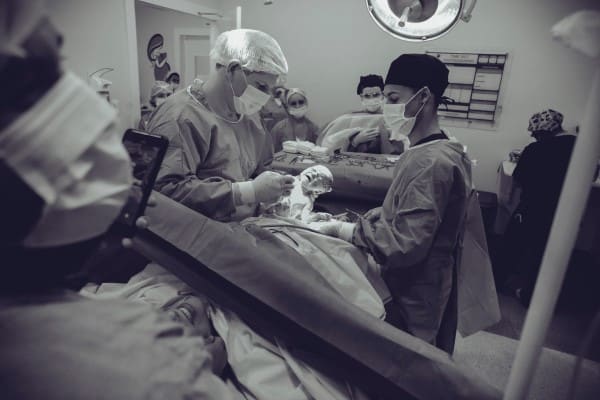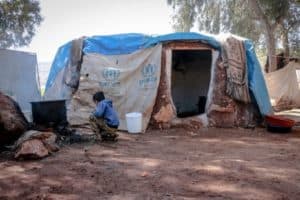This page contains affiliate links. This means if you a follow a link and make a purchase, at no additional cost to you, Humanitarian Careers will receive a commission. Thank you for supporting the site.
Midwives play a vital role in humanitarian responses. When communities are affected by disasters, crises and conflicts health services become disrupted and access to maternal services and places for safe child-birth becomes difficult for women.
Humanitarian NGO’s run a range of programmes to assist pregnant women and new mothers in times of crises and work to protect new-born infants during emergencies. Trained midwives can be deployed internationally by humanitarian NGO’s, as well as recruited from the affected communities into a wide range of jobs to support these projects.
Community Health Worker
Midwives working on humanitarian missions often work in the position of Community Health Worker. Community Health Workers are tasked with working on the front-line of communities affected by crises and poverty assisting with medical needs and distributing health information.
Midwives working in the role of Community Health Worker usually travel door-to-door within a community providing medical assistance to pregnant women and mothers.
The role of community health worker is a vital job for midwives within a humanitarian mission. Working directly with the people affected, midwives working as Community Health Workers as part of a humanitarian response must know the community well and build strong connections with women and families.
Midwives working as Community Health Workers will assist with pregnancies, child birth, breastfeeding, childhood nutrition and any complications that may arise.
Another key part of the job of Community Health Worker that midwives working on humanitarian response undertake is providing information to pregnant women, mothers and their wider families. Often this can include on breastfeeding, health protocols for new-borns and nutrition for children. Midwives working as Community Health Workers often have to provide information that goes against the community’s cultural norms and be able to work to align cultural practices with international standards.
The job of Community Health Worker within a humanitarian mission is often held by a midwife. As community health workers need to come from the community they serve, midwives are not deployed internationally as Community Health Workers.
However, often NGO’s will deploy midwives internationally to train community health workers on midwife best practices. Midwives can also be employed by humanitarian agencies to develop tools and procedures for Community Health Workers.
IYCF-E Councillor
Infant and young-child feeding in emergencies (IYCF-E) is the common set of procedure’s and recommendations for feeding new-born babies and children up to two years of age in humanitarian crises.
In humanitarian emergencies, feeding new-borns and children can be a challenge. Breastfeeding is the recommended method for children under one year of age in humanitarian crises zones as it can guarantee a source of highly nutritious food as well as avoid issues of sanitation around baby containers, including sterilisation and hygiene.
The job of the IYCF-E Councillor is to assist mothers and children in feeding.
Midwives are regularly recruited into the job of IYCF-E Councillor because of their training and expert knowledge in infant nutrition and breastfeeding. In disaster zones, a NGO’s will set-up specific areas for women to breastfeed. These zones are staffed by IYCF-E Councillors and midwives to assist with infant feeding and to provide information and recommendations to mothers affected by humanitarian crises.
The role of IYCF-E is a key role for midwives in humanitarian responses. NGO’s will recruit midwives from the local population to be IYCF-E Councillors as it is crucial women trust the councillor and that the councillor knows the local culture and infant feeding practices.
Midwives from the local population affected by a humanitarian crisis are often employed by NGO’s to work as IYCF-E Councillors. Midwives working as IYCF-E Councillors in humanitarian settings also work to contextualise international tools on infant feeding to the local population and sometimes receive training from midwives deployed from abroad into senior management roles such as Nutrition Technical Advisor or Programme Manager.
As IYCF-E Councillors need to come from the local community, humanitarian NGO’s to do not deploy midwives internationally to the role of IYCF-E Councillor.
Humanitarian NGO’s will recruit midwives from the affected population to work as IYCF-E Councillors and provide them training, if needed, as well set-up projects and spaces where IYCF-E services can be offered to women.
Medical Coordinator
The job of Medical Coordinator is one of the most senior medical roles in a humanitarian mission. The Medical Coordinator oversees all technical aspects of a humanitarian NGO’s health programmes.
As the Medical Coordinator needs to be medically qualified, it is common for trained midwives to have the job of Medical Coordinator. Often several years’ experience in humanitarian action is needed before working as a Medical Coordinator.
Midwives working in the role of Medical Coordinator in a humanitarian response are often employed to manage missions where there is are significant needs for pregnant women, births and young infants. Before an NGO launches a humanitarian intervention, a needs assessment is completed. This is where an NGO assess what an affected population requires and what services are already in-place.
If a humanitarian needs assessment determines an intervention assisting pregnant women, helping with births, building hospital services for premature babies or improving childhood nutrition is required, often a midwife will be recruited in the job of Medical Coordinator.
The role of the Medical Coordinator is to manage the humanitarian medical programmes. Midwives in the role of Medical Coordinator often oversee large teams, covering many medical disciplines.
As well as managing the technical aspects of the humanitarian intervention, midwives in the job of Medical Coordinator also oversee all aspects of project management including the budget, ensuring logistics are in-place, liaising on human resources and coordinating with other management-level staff.
Another key aspect of the job of Medical Coordinator is ensuring an NGO’s medical intervention is coordinated with the health authorities in-country, local medical actors and other NGOs. Often humanitarian medical actions work within hospitals and medical facilities that existed before the crises with the aim to repair or improving services.
Midwives working as Medical Coordinators will often be on projects to improve maternal care or services for pregnant women and mothers in local medical facilities.
Humanitarian Health Online Courses
If you are a midwife and looking to work in humanitarian aid, a great addition to your CV is an online course. We think the Emory University course on Health in Complex Humanitarian Emergencies is one of the best. It covers the key concepts of healthcare in humanitarian settings. Follow the link to the course’s page.
We also highly recommend the University of Copenhagen’s online short course in Non-Communicable Diseases in Humanitarian Settings. It only takes around 15 hours to complete, and we think it’s ideal for those wanting to work as a midwife in the aid sector. Click the link to find out more.
Another online course we recommend for those looking to work as a humanitarian midwife is the Manchester University Global Health and Humanitarianism course. It’s a fantastic overview of both the theory and practice of humanitarian aid and public health. The link is to the course’s page with more information.
SRH Technical Advisor
Sexual and reproductive health (SRH) is a key concern for people affected by humanitarian crises and poverty. Family planning and preventing sexually transmitted diseases are made more difficult by disasters and conflicts. Midwives play a crucial role in SRH programming in humanitarian responses.
The SRH Technical Advisor’s job is to ensure the SRH programme is ran correctly, with high quality tools and procedures and proper training for staff implementing the SRH project.
Midwives working in the job of SRH Technical Advisor as part of a humanitarian response will use their training in midwifery to support the SRH project.
Humanitarian NGO’s often deploy trained midwives into the role of SRH Technical Advisor because of their previous knowledge and background in sexual and reproductive health. The SRH Technical Advisor will either support a specific SRH project a humanitarian NGO is running, or support several projects, such as health or gender-based violence projects that need additional technical expertise in sexual and reproductive health.
Another key aspect of the job of SRH Technical Advisor is the development of new projects. Midwives working in the role of SRH Technical Advisor will conduct needs assessments – where NGO’s assess specific needs of communities they plan to intervene in. SRH Technical Advisors also develop funding proposals and are responsible for writing project reports.
Midwives will be recruited into the role of SRH Technical Advisor when a humanitarian NGO’s expects there to be great sexual and reproductive health needs in the area they are going to work.
The SRH Technical Advisor is a senior management role within a humanitarian response. Midwives wishing to work as SRH Technical Advisors with a humanitarian NGO will need some years of professional experience in humanitarian action on top of their formal midwife qualifications. They may also need to complete specific trainings in SRH and humanitarian work.
Advocacy Manager
Effective advocacy is one of the ways humanitarian NGO’s can affect long-term change. Responding to humanitarian emergencies can address the immediate needs of a population, but through advocacy systemic change can be achieved and future disasters can be mitigated.
Some humanitarian NGO’s run advocacy projects on the rights of women and girls, as well as for improvement for maternity services. Humanitarian NGO’s also advocate for breastfeeding as this is the best way to ensure good nutrition for new-borns in a disaster or crises.
Midwives are often recruited to the position of Advocacy Manager when NGO’s run advocacy campaigns relating to women’s and girls’ rights, sexual and reproductive health and issues relating to maternity and pregnant women. Midwives in the job of Advocacy Manager use their knowledge of maternity services best practice as well as their understanding of issues affecting women and girls to develop advocacy campaigns that can create long-term sustainable improvements.
Advocacy Manager jobs can be stationed within a humanitarian NGO’s HQ or within a country office. HQ Advocacy Manager positions often focus on campaigns in developed countries to change the public or governments view of issues affecting poorer nations or those affected by disasters or conflicts.
Midwives working as Advocacy Manager’s in an NGO’s HQ could work on campaigns such as highlighting the lack of maternity services for a crisis affected population or the need to increase government aid spending on sexual and reproductive health in particular country or region.
When trained midwives take on the role of Advocacy Manager in a humanitarian NGO’s country office, often the role involves running campaigns to change the affected populations view of an issue such as female genital mutilation (FGM). Midwives in Advocacy Manager jobs in country offices will also work closely with local and national authorities in that country to help develop policies and agendas that can improve issues such as maternity services, child marriage and access to family planning services.
Nutrition Programme Manager
The job of Nutrition Programme Manager in a humanitarian response is to oversee the implementation of nutrition projects. When humanitarian NGO’s run nutrition projects focusing on pregnant women, breastfeeding mothers and infants, often a midwife is recruited in the role of Nutrition Programme Manager.
Midwives working in the role of Nutrition Programme Manager are responsible for the set-up, management and transition or closing of an NGO’s humanitarian nutrition project.
The Nutrition Programme Manager is responsible for all aspects of the project’s implementation. This means that midwives working in the role of Nutrition Programme Manager in a humanitarian response will provide technical inputs, but will also be responsible for staff recruitment, project budgets, coordinating logistics and liaising with other NGOs and local authorities. Midwives in the job of Nutrition Programme Manager require additional skills and qualifications in humanitarian project management.
Another key aspect of the job of Nutrition Programme Manager is managing the project team. Midwives in the position of Nutrition Programme Managers will oversee teams working on achieving the project objectives – such as improving childhood nutrition, putting together food packets and distributions, improving rates of breastfeeding within a population or disseminating information to new mothers.
The Nutrition Programme Manger needs to ensure the whole project team is trained correctly and working well to achieve the objectives of the humanitarian intervention.
The job of Nutrition Programme Manager is a senior management role within a humanitarian response. Qualified midwives looking to work for humanitarian NGOs in the position of Nutrition Programme Manager will need several years’ experience in humanitarian action as well as specialised qualifications in humanitarian nutrition and project management.
Midwife Volunteer
A good way for qualified midwives to gain experience working in humanitarian action is through volunteering. There are many organisations and NGO’s that send midwives on volunteer missions as part of both development and humanitarian projects. These volunteer posting can be for short-term assistance responding to sudden-onset emergencies, as well for longer-term volunteer missions.
Completing a volunteer position can be good way for qualified midwives to transition into humanitarian work.
Midwives volunteering on humanitarian missions usually undertake one of two roles. The first is that of trainer. Midwives are often deployed into humanitarian and development projects to train local teams of midwives on international best practice.
Humanitarian crises can severely affect health services and often local medical staff need additional training and support. Training can be both practically assisting with births, child rearing, breastfeeding and child nutrition, as well as developing tools, practices and procedures.
The second key role a volunteer midwife may work as on a humanitarian mission is that of a midwife clinician. Working directly as a midwife delivering babies, assisting pregnant women and providing support to new mothers, midwives on humanitarian missions can be in a similar role to that as in their home countries health systems. Humanitarian crises and emergencies can disrupt health systems and often staff who regularly support in midwife roles need to leave due to the crises. Humanitarian NGOs can deploy midwives international to assist.
For those seeking a volunteer job as a midwife on a humanitarian mission, the VSO in the UK has volunteer midwife positions, as does the Peace Corps in the US and NGO’s such as Mercy Ships and Doctors of the World. There are also midwife volunteer positions as part the EU Aid Volunteer scheme and UN Volunteers. Completion of midwife training in the home country and some professional experience as a midwife is usually required to volunteer as a midwife as part of a humanitarian response.

Nutrition Technical Advisor
Childhood nutrition is a crucial part of many development and humanitarian interventions. Ensuring children receive the proper food and nutrients even during a disaster or conflict is vital to limiting the impact of the crises on their long-term outcomes.
Midwives are highly trained in assisting new mothers in childhood nutrition and so are regularly deployed by humanitarian NGO’s to advise on nutrition projects as part of long-term development work and crisis responses.
The job of the Nutrition Technical Advisor is to provide technical inputs to nutrition projects. Often humanitarian NGO’s running nutrition interventions require specialist expertise in the correct implementation of the projects. Midwives are well placed to provide this kind of technical advice.
With expertise in breastfeeding, childhood nutrition and mother and baby health, midwives are often recruited in the role of Nutrition Technical Advisor in humanitarian projects.
Midwives working in the role of Nutrition Technical Advisor on a humanitarian project will provide technical inputs to how the project is run. This can include developing tools and procedures for project staff, as well as providing technical trainings on nutrition and midwifery.
The job of Nutrition Technical Advisor also involves planning for the project and can include developing funding proposals, writing project reports, budget management and recruitment of project staff.
The role of Nutrition Technical Advisor is a senior management role within a humanitarian response. Often the Nutrition Technical Advisor will sit across multiple projects providing technical inputs as needed. Midwives wishing to work in the job of Nutrition Technical Advisors will need several years’ experience of humanitarian project management, as well as specific qualifications in humanitarian action and humanitarian nutrition.
Health Programme Advisor
Like the Nutrition Technical Advisor, the job of Health Programme Advisor is a senior management role within a humanitarian response. Humanitarian NGO’s running health projects require technical inputs to ensure the programme is run to high standards and that tools and processes are developed and implemented correctly.
Midwives are often recruited in the role of Health Programme Advisor for humanitarian medical projects where maternal needs have been identified as needing support and technical midwifery qualifications are needed.
The job of Health Programme Advisor is to support the humanitarian health project with specific technical expertise. Midwives recruited to the role of Health Programme Advisor often work across multiple health projects advising on correct maternal procedures, project designs and ensuring correct standards are met. Midwives in the job of Health Programme Advisor may also be responsible for writing donor proposals, grant reports and monitoring project budgets.
Humanitarian NGO’s often deploy midwives internationally in the role of Health Programme Advisor. This allows NGO’s to move trained midwives into humanitarian interventions where their skills are technical knowledge are needed.
Often the Health Programme Advisor is responsible for technical advice and works alongside the Medical Coordinator or project manager who overs see the projects implementation. The Health Programme Advisor can also be responsible for trainings the project teams.
Midwives wishing to work in the role of Health Programme Advisor within a humanitarian response will need several years of experience working in humanitarian action. As a senior management role, NGOs also require certifications in relevant areas of humanitarian response, on-top of formal qualifications in midwifery.
Midwives working in the position of Health Programme Advisor are either deployed on short-term humanitarian missions whilst retaining their job in the home countries health service, or for longer-term missions.
If you want to learn more about how to work as a humanitarian midwife, explore our list of the top humanitarian health online courses here.





